Bailout Plan Continuation of a Corrupt Banking System
Stock-Markets / Credit Crisis Bailouts Oct 06, 2008 - 03:06 PM GMTBy: Mick_Phoenix

 Welcome to the Weekly Report. A couple of weeks ago one of my subscribers asked me this question: "Does your scenario change of how you think things will play out i.e. bubble, easy money, inflation in fiat money supply, inflation in commodities and hard assets, inflation, fear of inflation, rising rates, YC inverting, flattening, rising and inverting again, tightening, withdrawal of liquidity, corrections, crashes, talk of stagflation, FEAR, withdrawal of speculative funds, further corrections and crashes, demand collapse.......Deflation.
Welcome to the Weekly Report. A couple of weeks ago one of my subscribers asked me this question: "Does your scenario change of how you think things will play out i.e. bubble, easy money, inflation in fiat money supply, inflation in commodities and hard assets, inflation, fear of inflation, rising rates, YC inverting, flattening, rising and inverting again, tightening, withdrawal of liquidity, corrections, crashes, talk of stagflation, FEAR, withdrawal of speculative funds, further corrections and crashes, demand collapse.......Deflation.
Assuming that Paulson passes the Bail out package as initially presented? Or will your scenario still hold, and we still are heading for eventual deflation. In other words can enough "moral hazard" prevent deflation."
I think it is a great question, it makes me take a fresh look at what I think will happen, as current events play out. Unlike many so called "free marketers" out there I do not believe the bail out plan is feasible in the form it took. However rather than just criticise I have decided to begin to examine some ideas about changing from the failed credit based monetary system to a system that outlaws the payment of interest and the use of leverage. For me this is the only justification for intervention, it must be used to allow transition away from a failed system. More of that in the second half of this article.
$700 Billion dollars have been created to supply liquidity to enable credit to flow once again from the Banks. All the Banks have to do is dump the toxic assets that are killing their balance sheets with the Federal Reserve (as predicted in a tongue in cheek article here ) allowing capital reserves to be lowered and releasing funds to enable lending to begin again. By the way capping pay and golden parachutes for Bank executives will not work, a half decent lawyer will find a way around that problem in his lunch hour.
This bail out is not a cure, it's a continuation of a failed, broken and corrupt banking system. I hope everyone noticed that the $700Bn payout was passed after the addition of another $100Bn in new tax breaks so that some of those previously voting nay could vote aye. We also discovered that the situation was so serious and the timing so tight that the US Treasury will move at breakneck speed to set up the auction process, they'll have something cobbled together in a month! Yet a week ago we told that a complete breakdown in the financial system was due within 2 days. Maybe the clocks run differently in Washington?
I digress. So has the scenario I have been following been affected by this bailout, this massive dose of moral hazard?
No, it has not. If anything we have begun to see the first round effects of deflation appear even as the supposed inflationary helicopter drops take place. This is a credit bust, Banks and now large Conglomerates are hoarding cash and cash like assets as they watch the contagion spread. It is the only way they can protect themselves as loans and creditors start to default. This hoarding of cash is apparent in this chart:
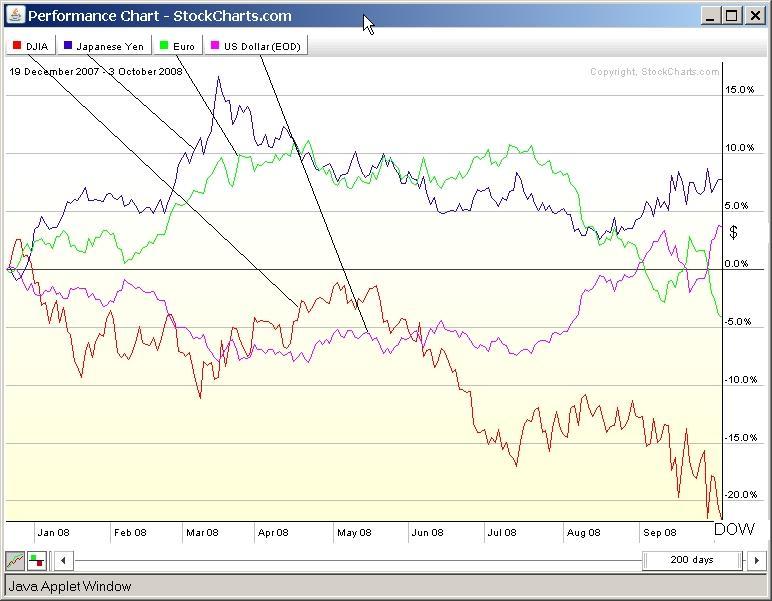
FX markets have not reacted as one would expect to a massive injection of $'s into the financial system. The Dollar is now stronger in relation to the Yen and Euro than at any other time over the past year. This at a time when the Fed have done this:
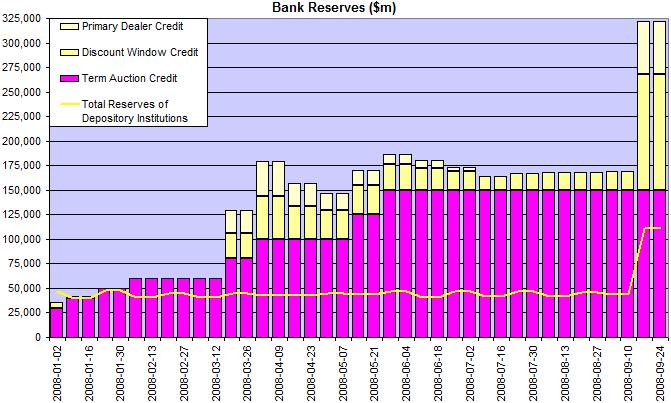
Thanks to Colin Twiggs at Incredible Charts
Why is the dollar stronger? Because there are less of them available in the economy and demand is still high. As I have said more than once, deflation is not just about the destruction of notes or electronic entries or even a reversing of the printing presses. Deflation can (and did) occur when $'s are locked away in vaults and the electronic equivalent of vaults, withdrawn from the economy and removed from the fiscal system.
How is this manifesting itself in financial markets? Here is the outstanding commercial paper (CP):
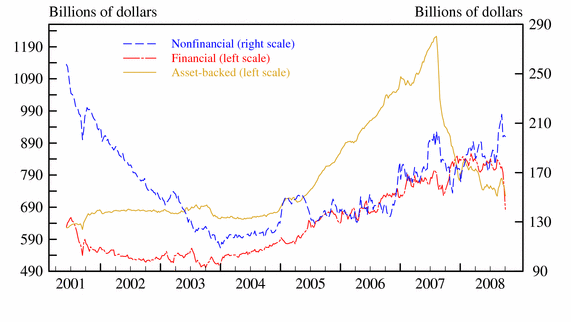
Asset backed CP has halved since mid 2007, a withdrawal of credit of about.....$650Billion. Add in the recent reduction in financial CP and we are at the $700Billion figure that Paulson/Bernanke quoted but wouldn't explain. It looks to me that the plan is to swap those toxic assets that no one will accept as collateral on short term loans for Government backed debt or, in extremis, cash. The hope is to reinvigorate the "borrow short/lend long" business model, the very model that imploded just over a year ago. It shows a staggering lack of understanding or imagination by the US Fed and Treasury.
This isn't even a bail out, it is a puncture repair patch slapped on the deflating tyre that is credit. What happens when the next layers of MBS/ABS/CDO devalue and become unacceptable as collateral for commercial paper? What happens when Credit Default Swaps fail to pay out on events? Do we just see Paulson bend down on the other knee as he begs for more?
The charts below tell the story of why it is different this time. AAA and BAA Corporate Bonds rates continue to rise as buyers look for a higher risk premium even as Fed Funds price in another cut:
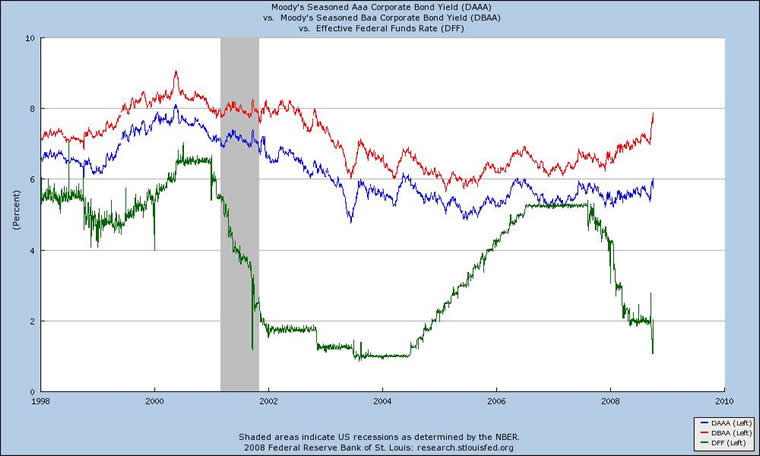
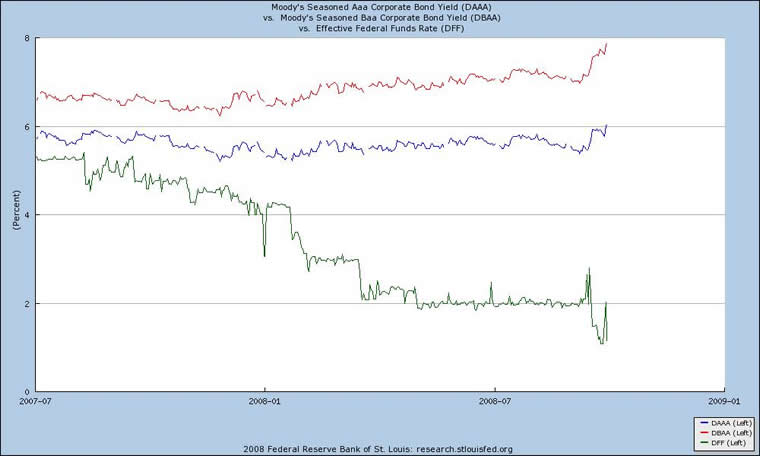
Spreads are now at levels last seen in the aftermath of 9/11, with one very important difference, corporate rates are in a rising trend, unlike the trend into mid 2003. Corporate Bond buyers are no longer pricing in a recession, they now see a real fear of widespread default. We have seen AAA corporate bonds go from risk free when compared to Fed Funds Rates to utter fear in 18 months. Corporate Bond Treasurers held an emergency conference this week as banks continued to tighten and hike rates on borrowing. "Capital is fleeing to safety" said Mr Liebert of Rohm and Haas.
The availability of credit has become scarce in all markets. The Municipal Bond market has all but frozen with activity down 85% from a typical week; college funding was effectively withdrawn by Wachovia.
The simple question is what happens when Corporations attempt to either roll or issue debt? Do they accept punitive rates as they bid for scarce funds or do they just repay what they owe and try to survive on cash flow? Corporations can no longer rely on rolling over debt to put off the payment of the original principal, they will have to build up cash reserves. That will force unemployment higher and investment and expansion lower.
Or do we see "bail out 2" forming on the horizon with the Fed and Treasury issuing cash in exchange for Corporate debt? Is the rest of the world willing to allow the US to "nationalise" Corporations so that they can continue to dominate global markets?
Why would such a bail out be required? Because in July Banks already expressed concern about economic conditions and the situation since then has, as we all know, deteriorated considerably since then. This from the Feds Senior Loan Officer Opinion Survey:
- 3.
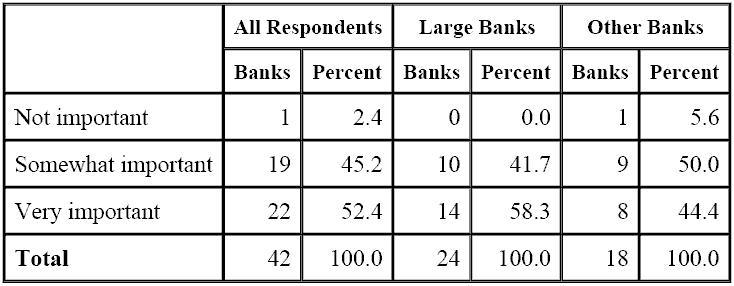 If your bank has tightened or eased its credit standards or its terms for C&I loans or credit lines over the past three months (as described in questions 1 and 2), how important have been the following possible reasons for the change?
If your bank has tightened or eased its credit standards or its terms for C&I loans or credit lines over the past three months (as described in questions 1 and 2), how important have been the following possible reasons for the change?
A. Possible reasons for tightening credit standards or loan terms:
b. Less favorable or more uncertain economic outlook
Does anyone doubt that the trend shown above has not accelerated? We are no longer faced with a crisis of confidence; the confidence has evaporated in the face of reality.
So where do I place us in the scenario?
- FEAR, withdrawal of speculative funds, further corrections and crashes, demand collapse.......Deflation.
There can be no doubt that fear has been shown and used over the past 2 weeks. We are seeing the withdrawal of speculative funds, the stock markets appear to be going through a series of mini corrections and mini crashes that are becoming more frequent and biased to the downside. Credit markets are imploding at an accelerating pace. The final flight to safety, US short term treasuries are seeing almost unprecedented buying. Investors are not worried about a return on their investments; they are fearful of investing in anything that might result in a loss of capital.
What of gold, the safe haven in troubled times?
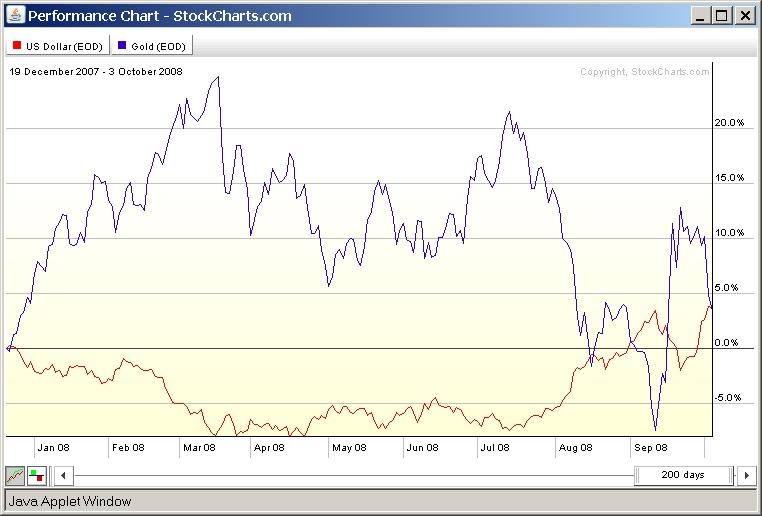
Courtesy of Stockcharts.com
We see the tight correlation that began in July to the Dollar continue. More disturbing for gold bulls is the clear downtrend in place. Gold isn't pricing further inflation into the scenario whatever the size of the bail out. Maybe this will change and a premium will be put back into the price but right now I doubt it. Gold is mirroring the moves in the dollar and with a shortage of dollar liquidity as demand increases the situation could last for some time.
I mentioned earlier that I did not believe the bail out was necessary in the form it took. It only buys a little time in a system that has already failed, like throwing your best reserves into a battle that is already lost. What is needed is the ability to see the battle is lost and organise an orderly retreat, acknowledging the failure of the battle plan and the losses it caused. You can then regroup and rebuild using the previous experience to find a new way to fight the cause, re-examining the strategic and tactical approach to the problems.
Bail out or no bail out the first thing we must recognise is that this battle is lost. It will result in much damage and hurt to individuals, corporations, small businesses and banks. It cannot be avoided. Now is the time to organise an orderly retreat, not by throwing resources at the sectors beyond repair but by preserving those areas that can continue.
We have to find a way to wean the economy of the world away from credit, away from leverage and into a mindset that allows savings to exist without the threat of inflation. This has to start with the US (and looking at recent evidence of deteriorating circumstances, Europe, Australia and New Zealand should not be far behind). Debt has to be drawn down, across the whole spectrum; the markets have already begun to do this as mentioned earlier.
This requires some long term planning and radical ideas. Debt has been attractive because inflation allows the debt burden to fall over time. Lenders are recompensed by charging interest on the amount lent.
This has to stop.
Here is the beginning of an idea of how the economy should be run in the future:
All mortgage and secured debt should be centralised and interest accrual suspended for the life of the loan. This would ensure that all underlying derivatives would also be secured. Payment should be made direct from the wages/income of the borrower.
Unsecured debt, including credit cards must be frozen and interest accumulation halted. The capital will be paid down by small payments direct from wages or pensions to the lender or whoever owns the debt if it has been re-packaged and sold on.
Lenders can offset outstanding debt against taxes at a set ratio.
Those who become unable to work or find work should have payments maintained from a Government funded insurance scheme. In exchange the claimant will donate time and effort to government volunteer projects.
If the lender funded the loan by "the borrow short/lend long" model then tangible assets and reserves should be used to pay off the short term borrowing. The long term debt will be serviced by a payment stream from the centralised mortgage pool. Banks would receive staged monthly payments to replace the centralised assets. (debt owed to a bank is an asset) If those mortgages have been sold on in MBS packages then the owner of the MBS receives the payment. If the bank does not have the capability to pay their short term borrowings then the income stream from the centralised fund will be used to make payment. During this period the Bank will be granted a protected status until their borrowings are paid off. During this period the Bank will not be allowed to accept deposits of make loans.
The Federal Reserve will have a remit to ensure that the dollar remains strong by use of deflationary measures. The Federal Reserve will use the reduction in the supply of money, not interest rates to control the dollars strength.
Interest rates will be abolished. The use of credit and leverage will be outlawed. Expansion will only be enabled from the use of savers long term deposits, lending using instant access accounts as collateral will not be allowed. Any lending using deposits must mature at the same time as the lock out to the deposit savings passes. Profits can be used for expansion but 10% of all pre-tax profit made using a loan must be placed in the reserves of the Bank or Corporation. Borrowers of such funds will pay 50% of the pre-tax profit made back to the Bank. If a loss is made then the assets of the company will be liable to recover the outstanding debt.
Depositors will be given a proportional share of the 50% profit made by the Bank on the loan. Taxes on profits will be structured to reward low risk returns for depositors, banks and borrowers. If a company uses profit from previous investment for expansion then tax breaks will be allowed on any further profit made.
What though of those who wish to purchase a home after such changes? With lending severely curtailed houses will have to re-price lower to a level where affordability is within the new lending regimes and the ability of potential buyers to save for and service. These prices will be much lower than current levels.
However the Government holding the centralised mortgages could reduce the outstanding debt, re-pricing it lower in lockstep with the falling prices in the market. This would reduce the income stream to those who previously held the mortgage debt but with the dollar strengthening both domestically and internationally the reduced back payments would have a stronger purchasing power, offsetting the loss of the number of dollars received.
What of exports? Well without the need to constantly expand wage bills and costs of materials exporters will be able to re-adjust prices lower in dollar terms. Wages and costs can be allowed to fall as the purchasing power of each dollar grows. Think of it this way, I would rather have $10 that could purchase Eu30 than $10 that bought Eu10. Of course imports will be cheaper using high value dollars, reducing energy and material costs. It would also attract inward investment.
Remember constant expansion of GDP in the current regime is only required because of inflationary effects. In a deflationary environment such expansion is no longer required, instead wise investment of savings into profitable enterprises would allow a grown of true wealth, measured by appreciation of the currency, the lack of debt and the strength of Government revenues.
Would this cause mass unemployment? I would point out that current levels of unemployment are rising and increasing month on month. This is not due to wise investment and the lack of the use of credit in an economy. Unemployment is rising because business is attempting to save cash and cut costs or the business has failed. This has happened in an inflationary environment. We may be heading for deflation but deflation did not cause this rise in unemployment.
Using deflation to control monetary supply allows current savings to appreciate and allows the dollar to have higher purchasing power. A Corporation would rather have the ability to invest and expand without having to allow for interest payments on debt or inflation affecting its income. Profitable enterprise will be rewarded and expansion will be because of demand for product. Success will attract expansion and increase employment.
This is just an idea based on the premise that to remove credit from an economy (and the leverage it needs in the form of inflation) requires a re-pricing lower of assets and a reduction of currency in circulation. It probably has holes in it as a plan but as I said the current situation requires a radical rethink and a solution that does not include the reasons for the failure of the current financial system.
Whilst the amount required from central funds (and foreign investment) would be far higher than the current $700Bn it would be used to change the way the economy functions, rather than attempting to allow a failed system to stagger forward for another few weeks or months.
Many will read these proto-ideas and dismiss them as unworkable. Whilst the plan is embryonic it cannot be criticised by applying current economic thinking. Keynes, Friedman et al belong in the dustbin of history, their theories are refuted by the results of the experiment.
What we do know and can demonstrate throughout history is that a strong currency and a lack of inflationary expansion does not result in a destruction of wealth. Such conditions encourage savings, investment and responsible expansion to meet a true demand. Profits are achieved through successful business models; investment in such business is rewarded by a share of the profits. However if the business fails then the risk is spread evenly amongst investors and the banks.
Banks must no longer have the ability to falsely inflate monetary supply through leverage; they must once again become custodians of savings and the steady hand on the tiller of investment. All banks must be subject to constant Federal oversight.
Eventually as debt incurred during the inflationary era is paid down or written off the system will stand on it's own without the need for Government intervention. Oversight will become the new buzzword, investment opportunities will be examined in detail with full transparency and excessive risk will be actively discouraged. The study of the financial disasters of the past 400 years will become a mandatory part of the education curriculum, students will be taught why inflation devalues savings and that paying interest on debt enslaves individuals.
If you want intervention then it must be in recognition that the system doesn't work, repeated intervention shows that the system cannot be repaired if it is based on false theories. Intervention can only be justified to change the system, not repair it. A move away from the current credit reliant financial system needs support during the transition; it has to allow time for the new "non credit" system to be set up and the re-education of the public, government and business in the new way money is used.
It is time for change but not the "change" politicians talk about. The world can and will prosper and improve the life of its inhabitants without the use of credit and leverage. Capitalism can function without credit, it is not a requirement of capitalism to have unbounded leverage. However capitalism does require savings, investment and a sharing of profits. It also requires failure and the results of such failure to function, clearing out poor business models and allowing others to try by applying new approaches and true innovation.
Finally and most importantly the public must ensure that those they elect to govern them and the appointees they make are answerable at all times for the good governance of the Country. To aid this all forms of paid lobbying must be outlawed and all the investments of public officials must be placed in a blind trust whilst they hold office.
By Mick Phoenix
www.caletters.com
An Occasional Letter in association with Livecharts.co.uk
To contact Michael or discuss the letters topic E Mail mickp@livecharts.co.uk .
Copyright © 2008 by Mick Phoenix - All rights reserved.
Disclaimer: The above is a matter of opinion and is not intended as investment advice. Information and analysis above are derived from sources and utilizing methods believed reliable, but we cannot accept responsibility for any trading losses you may incur as a result of this analysis. Do your own due diligence.
Mick Phoenix Archive |
© 2005-2022 http://www.MarketOracle.co.uk - The Market Oracle is a FREE Daily Financial Markets Analysis & Forecasting online publication.


